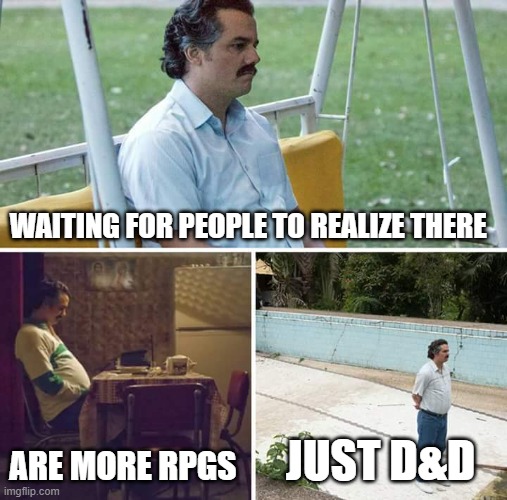That's different than not being a response to D&D.
Well, you want the history?
Well, let's see. First the earth cooled. And then the dinosaurs came, but they got too big and fat, so they all died and they turned into oil.
Um, maybe not the full history. The abridged history!
In the beginning, the TTRPG hobby was without form, and void, and darkness was upon the face of our hobby.
But lo, did Gygax and Arneson bring forth D&D!
And in 1977, Jason Morningstar (creator of Fiasco) came upon this creation, his uncle having bought it. And it was good! And thus did Jason play D&D, and then other games, loving the RPGs.
But in the late '90s, there was a darkness. A world of darkness, that arose in reaction to D&D. And so V:TM and D&D did fight mightily. And then there were those, such as Morningstar, who said, "Wait, is that all there is?"
And they gathered in the place that shall not be named, and discussed other ways to play. And Morningstar learned two valuable lessons:
I think it’s a common experience for someone to get exposed to theory (Forge theory for me) and suddenly see the light and want to share those insights with everyone. It makes a person a little hard to be around, and in my case I started telling my dear friends that everything they were doing was wrong. It took me a while to realize that what they were doing was not, in fact, wrong, and that my natural enthusiasm was making me be a dick. Whenever I see people making us versus them distinctions I cringe these days. I’m much more interested in practical tools and applications that theory can point toward than theory itself. If there’s any area where I think deeply, it’s authority and GM-less play, and even that is informed by play and practical observation.
1. He was interested in different ways to design games in reaction to D&D and the dominant paradigm.
2. Don't be d***.
And from there did Morningstar go on to create games that played with the division of authority.
TLDR; yes, Fiasco descended from D&D, in the sense that it was a reaction to the D&D paradigm and the creator got into RPGs with D&D. But in another sense, it didn't. Because it's not the same. Take all that as you will.




